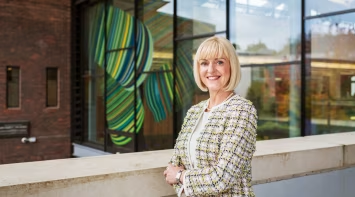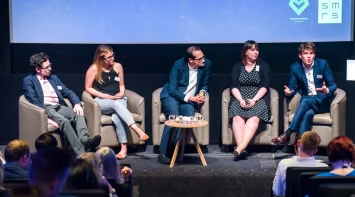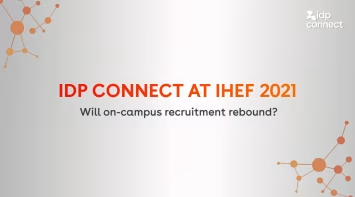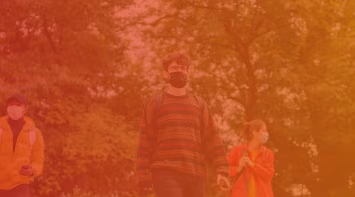Introduction
The nature of workplaces has changed considerably in recent years. At IDP - where ever the workplace is located - one thing that hasn't changed is the commitment to ensuring employees feel safe, included, respected, and above all, fulfilled.
As People Experience Coordinator, Stephanie Kinstler plays an important role in ensuring the people at IDP are part of an engaging and supportive environment from the moment they join the company, as well as many other key responsibilities.
We spoke with Stephanie to learn more about her role, how she became involved with IDP, the most rewarding aspects of being a People Experience Coordinator, what adopting a People Experience approach involves, and more.
Background
Hi Stephanie. Tell us about your role as IDP’s People Experience Coordinator. What does the average day look like for you?
My role as People Experience Coordinator primarily focuses on ensuring each of our team members has a positive and productive experience within IDP.
My day-to-day responsibilities can vary but regular points of call include assisting team members and people leaders with a wide variety of people related queries, onboarding, crossboarding and offboarding related activities, policy compliance, work health and safety, assisting with organising training and development initiatives, promoting team member wellbeing and inclusion, diversity and equity initiatives, as well as fostering an overall positive work environment where our people can flourish. My primary focuses shift throughout the year as the wider People Experience Team focuses on different matters, which keeps it interesting! A particular aspect of the role that I enjoy is cultural event planning – as a coordinator of IDP’s Australasian Cultural Committee, there is a lot of opportunity to organise and run cultural events and initiatives both in our local office, and all over our Australian region.
It’s great to see our teams both inside and outside Australia participate in team events together, share local cultural practices and celebrate both the individuality and cultures of our people and teams, but also celebrate the culture we build together at IDP.
Our Global People Experience team shares the same single vision: to ALWAYS be an INCLUSIVE and INSPIRED global COMMUNITY delivering SUSTAINABLE TRANSFORMATIONAL experiences; which informs the work we do on a daily basis.
You joined IDP in 2022. What initially attracted you to the role? Did you know about IDP beforehand?
I was already aware of IDP but hadn’t personally used any of the services. Back during my undergraduate studies, I was lucky enough to be able to undertake an exchange semester in Austria, which strengthened my interest in the international education space.
I also lived in on campus at several international student houses in Australia and overseas, which gave me a lot of exposure to students from all over the world. It was really an interesting environment! Years later I found myself working overseas in an environment with a lot of young students – many of them international students themselves. It was a really vibrant environment.
When I joined IDP, I was looking for a role within the human resources space that had a primary focus on team member engagement, within an organisation that has an interest in the wellbeing of its team members and wider community. By this time, I was very keen to work specifically within the international education space, as I had already had such a great time experiencing life alongside all my international student friends, colleagues and peers!
Mission
For those who aren’t aware, what is a ‘People Experience’ approach, and why is it so important to adopt in contemporary work environments?
I would say that a ‘People Experience approach’ is a modern and holistic way of thinking about and managing the relationship between an organisation and its team members. It emphasises creating a positive, engaging, and supportive environment for team members throughout their entire journey with the company, from recruitment and onboarding to ongoing development and then respectfully saying goodbye. There is much more of an employee-centric focus in this approach, as it recognises that a happy, engaged, and motivated workforce is more likely to be productive and contribute positively to the organisation.
All factors within a team member’s journey are factored by the People Experience team – including a team member’s physical work environment, tools and technology, relationships with colleagues and supervisors, and the organisation's culture and values are all very important factors, at any point of the journey. Basically, the approach recognises that happy and fulfilled team members are happier to be at work, more likely to stay within an organisation, have increased productivity compared to unhappy team members, have reduced over all stress and are more likely to have good relationships with their managers, colleagues, and wider team. Not only is it simply more fun to work with a generally happy team, but it’s good for business.
Happy team members are also likely to be innovative and creative, acquire new skills and develop professionally, be open to share and receive feedback, be adaptable and flexible... The list goes on!
Facilitating a great working environment can also help to build good relationships between our team members, which is also important in times where we need some extra help. It’s a lot easier to approach someone with your problems or concerns if you feel that you have a safe and supportive space to do so.
Has the constantly shifting formats of modern workplaces (i.e. Becoming more remote, or more in-person), affected the demands of People Experience? If so, how?
The constantly shifting formats of modern workplaces, particularly the transition to more remote or hybrid work arrangements, has definitely affected the demands and responsibilities of the People Experience team.
Managing the post covid needs and expectations from a variety of viewpoints can sometimes be tricky. Though, in this particular role, the team members in the Australasian team are located all around Australia, New Zealand, Japan… There was already a need to be able to facilitate connection and conversation digitally.
People Experience Specialists have needed to create and implement remote work policies, ensure team members have the necessary resources and technology for remote work, and provide support to remote team members who may face unique challenges related to isolation, work-life balance, and communication.
The reliance on digital communication and collaboration tools has increased, and People Experience must also be proficient in these tools and help team members navigate them effectively to maintain productivity and communication.
Engaging and maintaining a sense of belonging among remote team members is a priority – it’s a continuous effort to develop strategies to foster engagement in a virtual setting, such as virtual team-building activities, online recognition programs, and regular check-ins.
The remote work shift has brought mental health and well-being to the forefront. The People Experience team need to continue to ensure there is adequate resources and support for team members and promote a culture of well-being.
Looking Ahead
How do you expect the demands of your role to change in the near future?
It will be interesting to see how AI and automation can be better leveraged for tasks like administration and data analysis. Using smarter tools means that the team will have more time to work on bigger projects that impact team members positively.
Diversity, Equity and Inclusion efforts will continue to increase, and we will continue to develop and execute strategies for fostering inclusivity and addressing bias in all aspects of the team member experience. The emphasis on team member mental health and well-being will also continue – the People Experience team play a pivotal role in creating and implementing programs that support team member mental health and combat burnout. Additionally, continuous learning will be crucial for all team members to stay relevant – there is a need to continue developing and offering learning resources and support team members in their professional growth.
At the end of the day, what would you consider to be the most rewarding aspect of being the People Experience Coordinator?
For me, being able to help contribute to a positive and inclusive work environment where the team feels valued, respected, and engaged; and actively contributing to the overall success of the organisation definitely provides a sense of accomplishment and satisfaction.
Helping team members navigate challenges, providing support, and contributing to their overall well-being can be incredibly rewarding. It’s a great feeling to know that your actions (or the team’s actions) have had a positive impact.
This year, IDP Australia was certified as a Great Place to Work (GPTW), received a Workplace Gender Equality Agency (WGEA) certification AND received a CandE (Candidate Experience) award; demonstrating our commitment to inclusion, diversity and equity in the workplace from the beginnings of a team members journey, all the way through. It’s recognition of our commitment to creating a workplace that fosters collaboration, respect, and a sense of belonging. These achievements are not just accolades; they are the result of our incredible people who share a common vision!
You might like...
Higher education sector gathers to celebrate impressive increase in student satisfaction levels across UK
Whatuni Student Choice Awards 2024

University College Birmingham on the importance of student reviews
Discover how involvement in review collections has influenced UCB's marketing and reputation.

Welcoming A New Chair to the UK Strategic Advisory Board, Professor Lisa Roberts
Vice-Chancellor and Cheif Executive, University of Exeter



